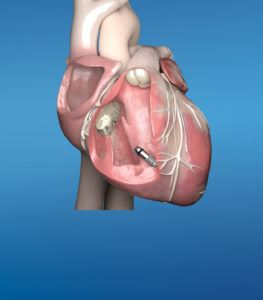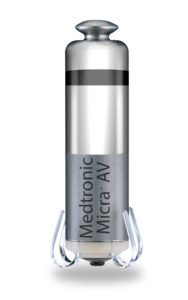With FDA Approval, More Patients in the U.S. Are Now Candidates for a Leadless Pacing Option

Image of Micra™ AV courtesy of Medtronic plc
DUBLIN, Jan. 21, 2020 (GLOBE NEWSWIRE) — Medtronic plc (NYSE:MDT) today announced it has received U.S. Food and Drug Administration (FDA) approval of Micra™ AV, the world’s smallest pacemaker with atrioventricular (AV) synchrony. Micra AV is indicated for the treatment of patients with AV block, a condition in which the electrical signals between the chambers of the heart (the atria and the ventricle) are impaired. Medtronic now offers the first and only FDA-approved leadless pacemaker portfolio, expanding the number of potential candidates for this groundbreaking technology in the U.S.
“With the approval of Micra AV, more pacemaker patients qualify for a new treatment option that offers the advantages of leadless pacing – including a minimally invasive implant procedure and a cosmetically invisible device,” said Larry Chinitz, M.D., cardiac electrophysiologist and director of NYU Langone’s Heart Rhythm Center in New York City. “Although complications with traditional pacemakers are infrequent, when they occur, they’re expensive to treat and can be invasive for the patient. Real-world use of Micra has shown a 63% reduction in major complications compared to traditional pacemakers.”

Image of Micra™ AV courtesy of Medtronic plc
Historically, patients with AV block have been treated with traditional dual-chamber pacemakers which are implanted in the upper chest, under the skin below the collar bone, and connected to the heart using thin wires called “leads.” Identical in size and shape to the original Micra Transcatheter Pacing System (TPS), Micra AV has several additional internal atrial sensing algorithms which detect cardiac movement, allowing the device to adjust pacing in the ventricle to coordinate with the atrium, providing “AV synchronous” pacing therapy to patients with AV block.
The Micra AV approval is based on data from the MARVEL 2 (Micra Atrial Tracking Using A Ventricular accELerometer) study, which evaluated the safety and effectiveness of accelerometer-based atrial sensing algorithms. The study evaluated the ability of the Micra’s internal sensor to monitor and detect atrial contractions and enable coordinated pacing between the atrium and ventricle, thereby providing AV synchrony. Results from the study, presented at the American Heart Association 2019 Scientific Sessions and published simultaneously in JACC: Clinical Electrophysiology, showed the primary efficacy objective was met, with a significantly greater percentage of complete heart block patients with normal sinus rhythm having >70% AV synchrony during algorithm-mediated AV synchronous pacing (38 of 40 patients, 95%) than VVI pacing (0 patients, P<0.001 for proportion of patients with >70% synchrony). The study’s primary safety objective was also met, with no pauses or episodes of pacing-induced tachycardia reported during algorithm mediated AV synchronous pacing.
Medtronic will begin training field personnel and physicians, and will activate a limited number of implanting centers in the coming weeks, with full launch anticipated later this spring.
“Since revolutionizing medicine with the first battery-powered cardiac pacemakers, Medtronic has continued to develop pioneering pacing technologies, culminating in the first miniaturized, leadless pacing portfolio for physicians and their patients,” said Rob Kowal, M.D., Ph.D., chief medical officer, vice president of medical affairs in the Cardiac Rhythm and Heart Failure division, which is part of the Cardiac and Vascular Group at Medtronic. “The introduction of Micra AV reinvents our own innovation, bringing the many benefits of leadless pacemakers to more patients.”
About the Micra Transcatheter Pacing System (TPS)
Approved by the FDA in 2016, the Micra TPS is a leadless pacemaker option for patients who only require pacing in the right ventricle. Comparable in size to a large vitamin, Micra is less than one-tenth the size of traditional pacemakers yet delivers advanced pacing technology to patients via a minimally invasive approach. During the implant procedure, the device is attached to the heart with small tines and delivers electrical impulses that pace the heart through an electrode at the end of the device.
Unlike traditional pacemakers, Micra does not require leads or a surgical “pocket” under the skin, so potential sources of complications related to leads and pockets are eliminated – as are any visible signs of the device.
In collaboration with leading clinicians, researchers and scientists worldwide, Medtronic offers the broadest range of innovative medical technology for the interventional and surgical treatment of cardiovascular disease and cardiac arrhythmias. Medtronic strives to offer products and services of the highest quality that deliver clinical and economic value to healthcare consumers and providers around the world.
About Medtronic
Medtronic plc (www.medtronic.com), headquartered in Dublin, Ireland, is among the world’s largest medical technology, services and solutions companies – alleviating pain, restoring health and extending life for millions of people around the world. Medtronic employs more than 90,000 people worldwide, serving physicians, hospitals and patients in more than 150 countries. The company is focused on collaborating with stakeholders around the world to take healthcare Further, Together.
Any forward-looking statements are subject to risks and uncertainties such as those described in Medtronic’s periodic reports on file with the Securities and Exchange Commission. Actual results may differ materially from anticipated results.
Ryan Mathre
Public Relations
+1-651-335-2338
Ryan Weispfenning
Investor Relations
+1-763-505-4626
